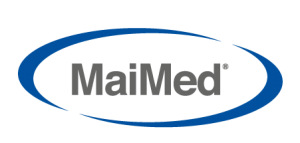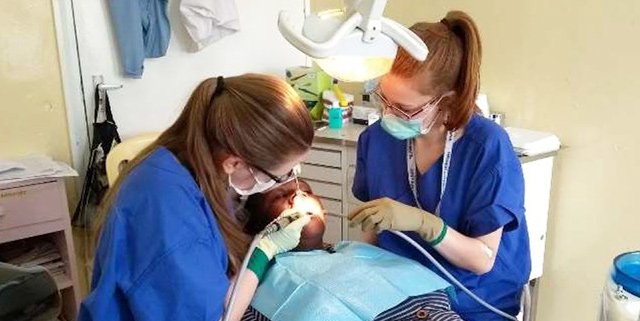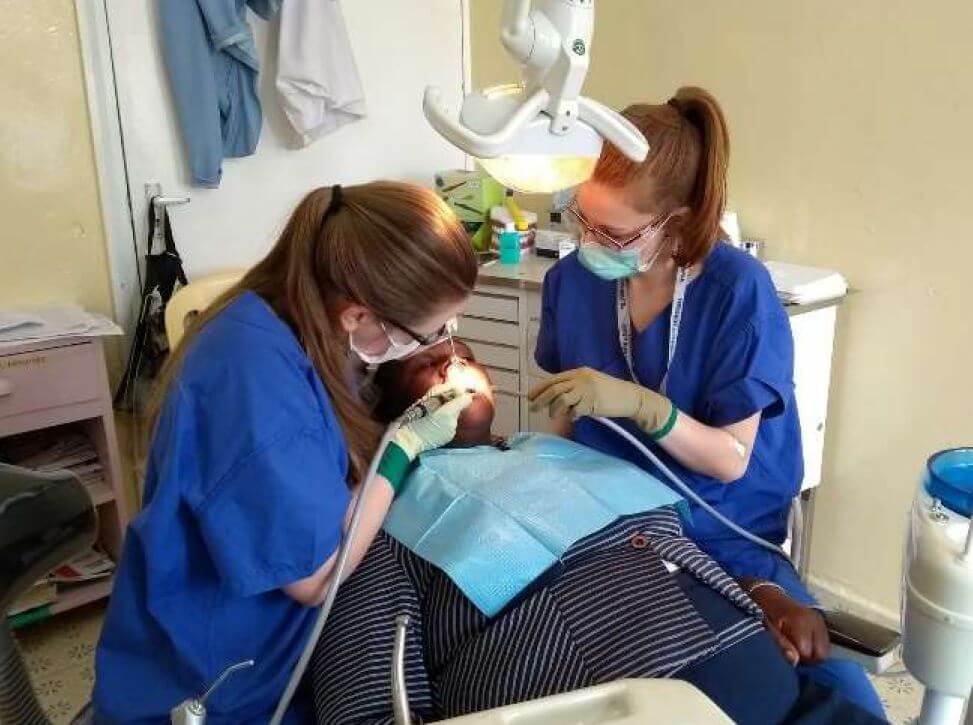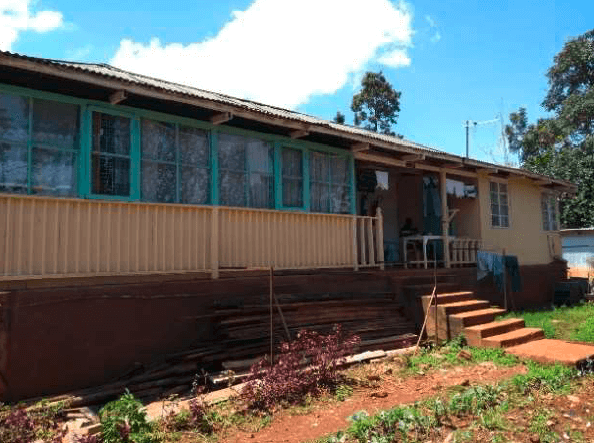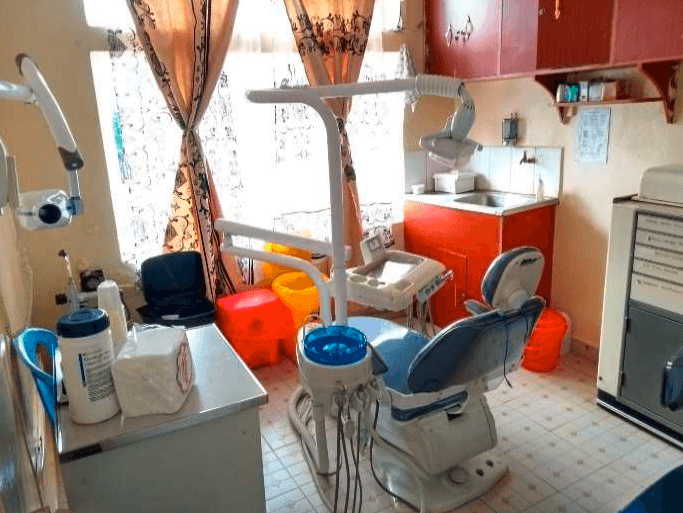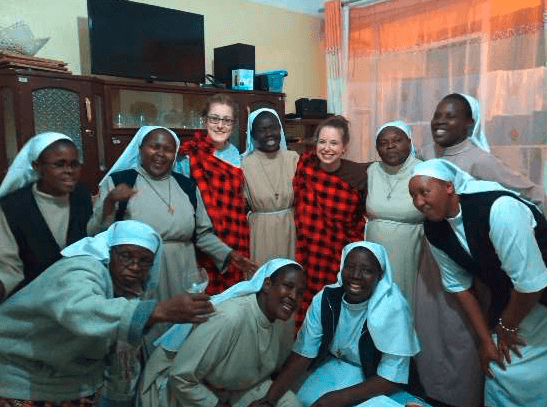Product donation Kenya
It had long been clear to us that we didn’t want to start working immediately after graduating. We wanted to combine work and holidays in an internship, while expanding our skills and at the same time supporting the local people. Still during our state examination … the planning of our internship began. After long consideration we decided for the organization “Dentists for Africa” in Kenya, because they had convinced us with many years of experience and good organization. Before we could start there was still a lot to do. We decided for the period March/April 2018 and on recommendation of the organization for the location Kisii. Dentists for Africa provided us with a very detailed guide and arranged the contact between Sister Fabian, the Kenyan dentist on site, and us. In December 2017 we booked our flights and our subsequent safari with a local tour operator for the last 9 days. As soon as we had received our official Dentist for Africa certificate, we were able to apply for the 350 Euro travel allowance from the DAAD (see www.zad-online.com for detailed instructions). Unfortunately, the amount was not nearly enough to cover our travel and flight costs, but we were very happy about it. At the same time we started the appeal for donations at numerous companies for dental and medical products. From the organization’s guidelines we could find a list of the most needed materials and additionally we informed ourselves about the situation in Kisii from Sister Fabian. The fundraising was very time-consuming, could be frustrating from time to time due to cancellations or lack of feedback, but was all the more fun when companies generously supported us and shared our enthusiasm for the project. We contacted a total of 82 companies, 24 of which agreed to make a donation. We would like to take this opportunity to thank all our sponsors (see below) for their generous support, which made not only us but also the Kenyans very happy. We asked the travel doctor for advice and prepared a vaccination plan. We also exchanged Kenyan shillings and 50 dollars (for the visa). We completed our equipment with headlamps, powerbanks, mosquito nets, cabin sleeping bags, neck pillows (recommendation for the plane and each offroad safari NoBite, sun cream and waterproof pack bags as replacement for plastic bags (import ban in Kenya). Finally it was time and we started in the car with a lot of luggage towards Frankfurt. Every gram of our 4x 23kg luggage and 2x 12kg hand luggage was exhausted, especially with material donations. We would have liked to have transported all the donations, but the airline unfortunately didn’t allow us any more free luggage. The remaining donations will be brought to Kenya this summer with other materials and equipment in a large freight container from Dentists for Africa. From Frankfurt we flew to Amsterdam, on to Nairobi and finally to Kisumu. We didn’t declare our donations to customs but traveled with the official material donation certificate of Dentists for Africa. In Nairobi we were actually checked by customs, but only gifts were asked for. We honestly opened one of the 4 suitcases, which contained only clothes and a few presents. With it the lady of the customs was content and we were allowed to pass.
At the airport in Kisumu Sister Lawrencia and Vincent, a driver, welcomed us very warmly. The way to the hospital lasted longer than the announced two hours, because typical for the Kenyans on the way all the tasks were done and more passengers were collected and dropped off. The Kenyan roads take a lot of getting used to because they have deep potholes and many brake thresholds. On unpaved roads the condition is even worse. (Functioning) seat belts are also a rarity. We reached our destination, the Christamarianne Mission Hospital, where we were accommodated in the guest house on the hospital grounds. For two weeks two doctors of medicine lived with us in the guesthouse, who also completed an internship with Dentists for Africa. The house is kept simple. It has 3 bedrooms with adjoining bathrooms, a lounge with common fridge and a small kitchen with stove, microwave, toaster and electric kettle as well as a small terrace. The catering was done by two very nice chefs, Gilbert and Simon, who gave their best every day to fulfill our wishes.
There was never a lack of food, drinking water was also provided. For board and lodging we pay a contribution of 1000 KES per day to the hospital. Sister Lawrencia was always available for us either in the office or in the convent. We were able to contact her with everything and always informed her about our leaving the hospital premises. She organizes the central material warehouse of Dentists for Africa in Kenya and is also responsible for the digitization of the hospital files of HIV patients, with whom she hardly followed. In February there were 1557 newly registered HIV cases. However, we were well informed by the guidelines and equipped ourselves with double glove systems, protective visors and mouthguards beforehand. In an emergency, the hospital is equipped with HIV post-exposure prophylaxis. The RWTH Aachen could not provide us with these on request. Our daily work started at 9.00 a.m., around 1.00 p.m. there was a lunch break and around 4.00 p.m. the Dental Clinic closed. The whole time Davine, a dental assistant in training, who has grown very fond of us, and partly Sister Fabian, the Kenyan dentist, worked with us. The other members of the team were two Dental Health Workers (Jeal and Tony), two dental technicians (Sharon and Dickson) and Felix, the medical technician. The Dental Clinic consists of two rooms, each with a dentist’s chair. Both rooms are similarly well equipped so that any kind of treatment can be carried out. There is also a small dental laboratory where prostheses can be made. We laid both amalgam and composite fillings, as well as GIZ and cement fillings. We were also able to use our donated 3D matrix system. Dental cleaning was carried out with an ultrasound scaler and for root canal treatments we had an X-ray machine for dental films and an apex locator at our disposal.
The treatment is made more difficult every now and then by short power failures. The most frequent treatments were extractions and fillings (for children). This is due to the relatively high prices of the hospital for other treatments. Dentists for Africa pays the full costs for school visits and mobile missions and the subsequent necessary treatments. We were also allowed to become part of such an outreach in the Nyaura Primary School, where we did education and examined about 300 students, who we then treated in hospital if necessary. In general, we expected the oral health of the children to be worse. As a rule, we found a maximum of 1-2 teeth requiring treatment per child (extraction or filling). Many reported that they did not have a toothbrush, so that Sister Fabian planned another visit where we were allowed to give each child a toothbrush with toothpaste. This experience was absolutely unique and the joy and gratitude of the children was very touching. The treatment of the school children made up a large part of our patients. The children were very brave during treatment and endured any suffering silently. In order to be able to experience a school assignment, you should coordinate your assignment with the school holidays of the Kenyan children beforehand. We thought it would be easier to communicate with the patients in English as it is a national language. The communication with the staff in the project worked very well in English. Many patients, however, only spoke Kiswahili or a few words of English. So we learned the most important words in Kiswahili, which made a lot of things easier for us. The team was always happy to translate for us. The patient clientele is clearly different from the German patients we know. It does not make much sense to schedule appointments with time, only one date is usually kept. Patients are very patient and do not expect to get to it immediately.
In principle, the number of patients varies greatly. Especially with rain clouds or actual rain one has to expect very few to no patients and also Friday was mostly empty. The large ignorance leads to the fact that patients come to a treatment much too late and often the extraction remains the only possibility, which also clarifies the often pronounced gap bite. We have noticed time and again that very few people know that teeth should be brushed at least twice a day for 3 minutes. We had the opportunity to visit another dental clinic in Asumbi, where the Motherhouse of the Franciscan Sisters is located. The girls from the neighboring high school were treated there for one day. Unfortunately we lived in the guest house of the sisters due to a defect without electricity and warm water. You have to reckon with something like this from time to time. In the afternoon we got a detailed guided tour through the village and its buildings. We took part in another mobile operation in the hospital in Marani. On plastic chairs we extracted a row of teeth in a tent. Mainly adults who cannot afford treatment or reach the nearest dental clinic. Further treatments were referred to the hospital in Kisii. We also got to know Dr. Schinkel, the founder of Dentists for Africa. Among other things, he travelled to Kisii for a weekend seminar at which we all got to know Dentists for Africa’s supporters in their education. We were able to gain insights into the experiences, wishes and difficulties of the students. The purpose of the seminar was to optimize the situation on site and to better reconcile the goals of the organization with reality. In our spare time we explored the hospital with all its animals and vegetable beds. We visited the patient’s kitchen and bakery and were shown how to prepare Kenyan specialties (Mandazi and Chapati). On Easter Sunday we attended a church service. In addition we made small trips to the market. There was a varied offer of fruit and vegetables. Other errands we did in the supermarket. We baked some cakes together with our cook as a present for the Sisters on special occasions. They often invited us to dinner, e.g. we celebrated Easter together and said goodbye to guests like the doctors of medicine and Dr. Schinkel. In the afternoon we often enjoyed the sun on our terrace, at least until the next rain shower. The waiting area in the hospital, in which one could receive bad WLAN, became likewise a frequent place of residence. It is really worthwhile to buy a Safaricom Sim card for 200 KES and recharge it for 4G Internet (135MB for 50 KES for 7 days). Another highlight was the hairdresser’s visit with Davine, where we could admire the African art of artificial hair braiding. They were very surprised that even we can braid hair. We also came back to the offer of Sister Lawrencia, who organized us a trip to the Kakamega rainforest.
The rainforest and the Rondo Retreat Center are really worth a visit. The facility is beautifully located in the middle of the rainforest and very relaxing. Sister Lawrencia gave us the price for the locals. We additionally booked two guided hikes, one a day and one at sunrise on a mountain. Sister Lawrencia suggested us further destinations to Lake Victoria, Masai Mara or Nakuru National Park. Unfortunately we could not see Lake Victoria due to lack of time and a number of national parks were covered by our subsequent safari. We can highly recommend to take time for a safari, as you can simply experience much more with off-road vehicles and overnight stays in the national parks. In our 9-day safari we visited Masai Mara National Park, Lake Naivasha National Park, Ambosli National Park and Tsvao West National Park. The trip ended in Mombasa on the beach. We liked Masai Mara very much because of the variety of animals. We could experience the “Big Five”, except the rhino, and many other animals in their natural environment. In Amboseli and Tsvao-West National Park we could also admire the Kilimanjaro and enjoy beautiful sunsets. We had a really unforgettable time in Kenya. The Kenyans have always been open and cordial to us. Especially the Sisters lovingly welcomed us into their circle and took care of us very touchingly. The stay was a special enrichment in personal as well as in professional respect.
We enjoyed our time very much and would like to thank everyone who made this possible for us. We thank Dentists for Africa, our families and friends, the DAAD, as well as the numerous sponsors. Many thanks to our sponsors (in alphabetical order):
3M Deutschland GmbH, Bausch GmbH, Busch & Co. GmbH, Clinic & Job Dress GmbH, Colente Group, Dentsply Detrey GmbH, Anton Gerl GmbH, Golf Toys GmbH, E. Hahnenkratt GmbH, Kulzer GmbH, Horico Dental Hopf, Ringlab & Co. GmbH, Hu-Friedy Mfg. Co., Ivoclar Vivadent GmbH, Karl Hammacher GmbH, Komet Dental/Gebr. Brasseler GmbH & Co. KG, Kuraray Europe GmbH, M+W Dental GmbH, MaiMed GmbH, MPS Dental GmbH, Nordiska GmbH & Co.KG, Polydentia SA, Romesco Handelsges.m.b.H, VOCO GmbH.
Asante sana Kenya!
Thank you Kenya!
Kwaheri!
Good bye!
